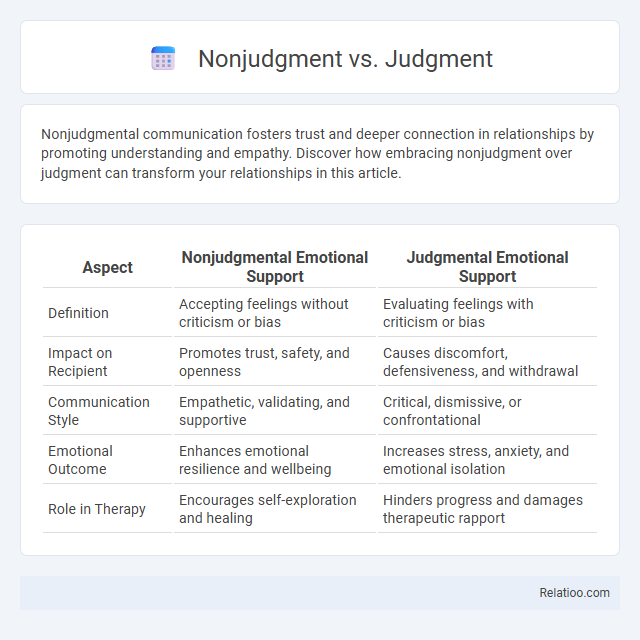Nonjudgmental communication fosters trust and deeper connection in relationships by promoting understanding and empathy. Discover how embracing nonjudgment over judgment can transform your relationships in this article.
Table of Comparison
| Aspect | Nonjudgmental Emotional Support | Judgmental Emotional Support |
|---|---|---|
| Definition | Accepting feelings without criticism or bias | Evaluating feelings with criticism or bias |
| Impact on Recipient | Promotes trust, safety, and openness | Causes discomfort, defensiveness, and withdrawal |
| Communication Style | Empathetic, validating, and supportive | Critical, dismissive, or confrontational |
| Emotional Outcome | Enhances emotional resilience and wellbeing | Increases stress, anxiety, and emotional isolation |
| Role in Therapy | Encourages self-exploration and healing | Hinders progress and damages therapeutic rapport |
Understanding Nonjudgment and Judgment
Understanding nonjudgment involves recognizing experiences, thoughts, and emotions without labeling them as good or bad, fostering acceptance and mindfulness. Judgment, by contrast, entails evaluating and categorizing these experiences, often leading to biases, stress, or conflict. Developing nonjudgment encourages openness, reduces reactivity, and supports mental well-being by promoting a balanced awareness free from critical appraisal.
The Psychology Behind Judgment
The psychology behind judgment reveals how your brain processes information by categorizing experiences as either positive or negative, influencing emotional responses and decision-making. Nonjudgment involves observing thoughts and feelings without labeling them, which promotes mental clarity and reduces stress by minimizing cognitive biases. Embracing nonjudgment fosters emotional resilience and enhances self-awareness, enabling you to respond to life's challenges with greater psychological flexibility.
Benefits of Practicing Nonjudgment
Practicing nonjudgment cultivates greater emotional resilience and reduces stress by allowing Your mind to observe experiences without attachment or criticism. This mindful approach enhances self-awareness and promotes compassionate interactions, fostering healthier relationships and overall well-being. Embracing nonjudgment encourages acceptance, which can lead to improved mental clarity and decreased anxiety.
How Judgment Shapes Our Perceptions
Judgment shapes our perceptions by filtering experiences through predefined beliefs and biases, often limiting our understanding of others and situations. Nonjudgment fosters openness, allowing you to see reality without distortion or attachment to labels, which enhances empathy and clarity. Embracing nonjudgment strengthens emotional intelligence and promotes more balanced decision-making.
Common Triggers for Being Judgmental
Common triggers for being judgmental include stress, fear of uncertainty, and low self-esteem, which prompt individuals to assess others harshly as a defense mechanism. Recognizing these triggers can help you cultivate nonjudgment by fostering empathy and self-awareness, reducing automatic negative evaluations. Practicing mindfulness and challenging cognitive biases are effective strategies to shift from judgment to nonjudgment and ultimately to a balanced perspective.
Nonjudgment in Mindfulness Practices
Nonjudgment in mindfulness practices emphasizes observing your thoughts and feelings without labeling them as good or bad, fostering greater self-awareness and emotional balance. This approach contrasts with judgment, which involves evaluating experiences and often leads to stress or anxiety. Cultivating nonjudgment allows you to respond to situations with clarity and compassion, enhancing overall mental well-being and resilience.
Social and Cultural Influences on Judgment
Social and cultural influences play a pivotal role in shaping judgment, as norms and values embedded in a community inform what is considered acceptable or deviant behavior. Judgment often reflects internalized societal biases and stereotypes, which can perpetuate stigma and exclusion in interpersonal interactions. Nonjudgment practices emerge as a conscious effort to transcend these ingrained prejudices, promoting empathy and inclusivity by recognizing diverse cultural perspectives and experiences.
Overcoming the Habit of Judging Others
Overcoming the habit of judging others requires cultivating nonjudgmental awareness, which allows individuals to observe thoughts and behaviors without attachment or criticism. Embracing nonjudgment fosters empathy, reduces conflict, and promotes emotional resilience by recognizing the complexity of human experiences beyond surface-level evaluations. Consistent practice of mindfulness and active self-reflection can rewire cognitive patterns, creating a sustainable shift from judgment to compassionate understanding.
Practical Steps to Cultivate Nonjudgment
Cultivating nonjudgment involves mindfulness practices such as observing thoughts without labeling them as good or bad, which reduces emotional reactivity and fosters mental clarity. Engaging in daily reflection and self-compassion exercises helps shift from critical judgment to acceptance, promoting emotional resilience and healthier relationships. Consistent practice of nonjudgment enhances cognitive flexibility and supports stress reduction by encouraging openness and curiosity toward experiences.
Transforming Relationships Through Nonjudgment
Transforming relationships through nonjudgment involves embracing empathy and open-mindedness that foster deeper connections and mutual understanding. Judgment often creates barriers by imposing preconceived notions, whereas nonjudgment allows you to listen without bias, promoting trust and emotional safety. Your ability to practice nonjudgment can lead to healthier communication and more authentic interactions in both personal and professional relationships.

Infographic: Nonjudgment vs Judgment
 relatioo.com
relatioo.com